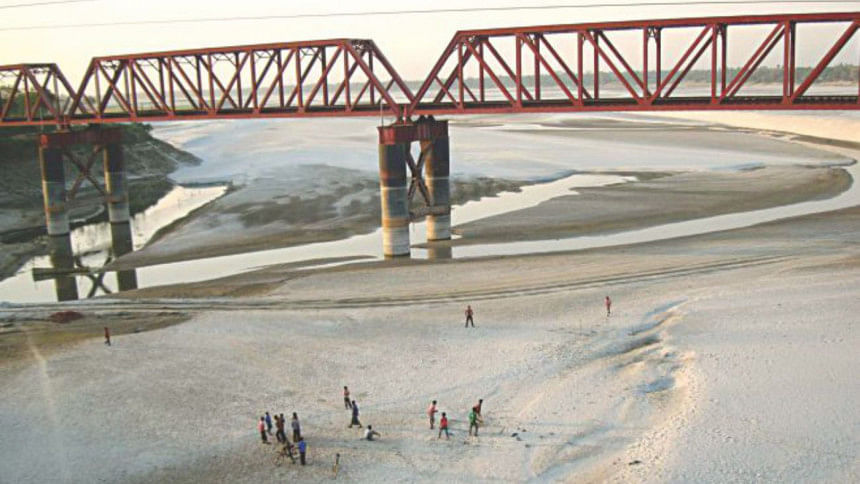Our dying rivers and hopes for water justice

This is ironic and self-contradictory on the face of it. On the one hand, you read in the paper an eight-part series on mostly dead or moribund rivers all over the country—700 in total, of which 54 are trans-boundary rivers. On the other, you get to hear of Bangladeshi experts preparing to impart their knowledge of rivers to the Bihar state government!
When our compatriots hold within themselves such a pool of expertise, why have our rivers been allowed to be reduced to a feeble shadow of their former selves? Reports after reports portray the sordid spectacle of dried out rivers being crossed on foot, playable as cricket ground, or illegally occupied to raise crops or just abandoned as swathes of sands disappearing into the endless horizon. Desertification is palpable; geomorphology, biodiversity and ecological balance are endangered.
The question that quizzes you in particular is whether Bihar government's request for cooperation with our specialised institutes relates to head water management to the exclusion of the water concerns of the lower riparian Bangladesh. I reckon—and this will hopefully resonate with the other side—that this is not an either-or issue. And it is both feasible and desirable that the potential for fruitful interaction be fully utilised not just to allay but squarely address Bangladesh's concerns over her share of the flows during the lean season. Alongside ways need to be devised to augment dry season flows wherever required. Teesta remains a litmus test for the sake of providing water justice to Bangladesh.
That India has reposed confidence in two centres of excellence situated in Bangladesh to draw on their experience and expertise offers an important platform for taking up river issues as they emerge.
The institutionalisation marked its embryonic stage in 1986 in the form of Surface Water Stimulation Modelling Programme (SWSMP). The floods in 1987 and 1988 gave impetus to developing the Institute of Water Modelling (IWD). This came into being "to provide world class services in the field of water modelling, computational hydraulics and allied sciences for improved integrated water resources management."
Then followed the Center for Environmental and Geographic Information Services (CEGIS). This government research institute is a centre of excellence "responsible for water system development and water capacity development."
Now the Bihar government has entrusted these two Bangladeshi institutions to help set up an Institute of Mathematical Modelling. In fact it has gone further to urge the IWD and CEGIS of Bangladesh to provide training to experts, environmentalists and engineers on river monitoring and preparing forecasts pertaining to river erosion.
We are proud to have such institutions making their presence and worth felt. In UK, France, US, and Holland, such organisations belong to the private sector and they charge fees for their services.
Just as there have been loving odes to rivers from poets, the serenading lyrics for once-ebullient streams like maidens of nature also abounded. For us in the region, it is time for penance over man's selfish interference with natural flows of the rivers. The penitence should now translate into a collective resolve for basin-wide cooperation to rejuvenate the river systems aimed at reaping multiple benefits in line with what BG Verghese's famous book Waters of Hope pictured and strongly advocated.
A forceful campaign launched a decade and a half ago to save the dying lifelines of rivers surrounding Dhaka had evoked a dynamic response from the highest level. The courts also exercised judicial activism and interventions directing all concerned to restore the rivers around Dhaka to their original banks and create green belts along their banks. The battle against the grabbers and polluters has to go on until the last vestiges of illegal occupation are done away with.
Simultaneously, the government must energetically dredge up the heavily silted and plastic-filled riverbeds to make them flowing and navigable.
Finally, it is of utmost importance that we convince the Indian government of our vital interest in seeing the Joint Rivers Commission making a serious bid to resolve the outstanding water issues between our two countries. Water is as much a survival issue as it is a justice and right-centric one—this cannot be lost on Narendra Modi.
Shah Husain Imam is adjunct faculty at East West University, a commentator on current affairs and former Associate Editor, The Daily Star.
Email: [email protected]





Comments